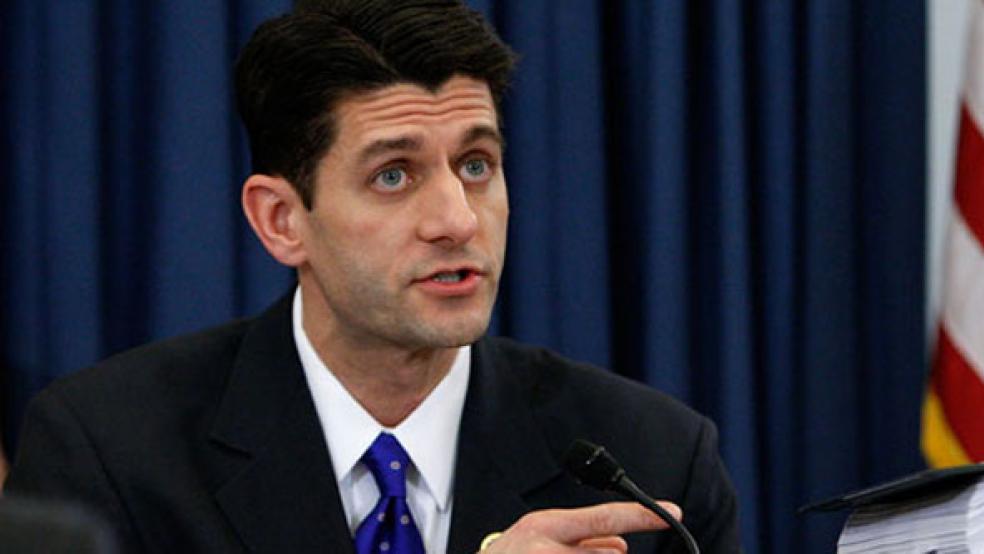If you can be sure of one thing in this world, it’s that when Rep. Paul Ryan (R-WI) starts talking about poverty, things are about to get interesting.
So when he appears at the American Enterprise Institute on Thursday morning to deliver his latest proposal for reforming the social safety net, he’s almost certain to make some news.
Whether it’s good news or bad remains to be seen.
Related: Paul Ryan’s New Idea Is Really Smart, But Will It Fly?
The House Budget Committee chair and most recent Republican nominee for vice president has an abiding interest in the topic, which over the past few years has resulted in some memorable moments, including his being publicly criticized by Jesuit priests, mocked for a staged photo op in which he washed dishes in a soup kitchen, and criticized by academics who disagreed with his use of their research.
Then there was the unfortunate comment about black men in the inner city.
But it hasn’t all been bad news for Ryan. His return to the national stage in 2013 as a poverty fighter earned him a lot of positive press. In a major speech at the Brookings Institution in January, he earned praise for his openness to new ideas, such as the “universal credit” experiment ongoing in the United Kingdom. And he has a small army of anti-poverty advocates, some of whom he has been working with for years, who are happy to testify to his deep and honest concern for the poor.
If you add up the positive and negative press and other public attention Ryan’s efforts on poverty have earned him, it’s overwhelmingly weighted toward the negative. And that leads to a fairly obvious set of conclusions: He’s doesn’t keep coming back to the subject for the publicity. When he says he wants to do something about the plight of the poor, he means it.
Related: Why Paul Ryan May Be the One to Beat in 2016
People can disagree about whether his ideas are the right ones – and they do. But it’s gotten to the point where accusing Ryan of purely cynical motives requires assuming he’s some kind of three-dimensional chess-playing strategic mastermind.
Early reports from The Wall Street Journal and The Washington Post, among others, suggest that Ryan’s Thursday morning proposal will be another refinement of some of his previous recommendations.
For example, he is expected to propose a pilot program to test consolidating the many different safety net-related payments the federal government makes to states – food stamps, housing grants, etc. – into a single payment called an “opportunity grant.” The idea is to reduce duplicative bureaucracy and provide states with more flexibility.
The opportunity grant seems to be a twist on an earlier Ryan proposal to similarly consolidate the payments individuals receive from the government into a single “universal credit.” Ryan has argued that not only would this reduce the bureaucracy related to the social safety net, it would also give the poor a smoother path out of poverty as they begin earning money. Rather than seeing certain benefits disappear altogether when they hit a particular income threshold, the assistance to low-income workers could be set to taper off gradually as earnings increase.
Related: The Idea Man Influencing Paul Ryan’s Anti-Poverty Plan
He is expected to lay out a plan for delivering expanded financial relief for the poor through tax credits, and to advocate for reduced regulation in areas such as basic service industries -- think beauty salons and nail parlors – that might make it easier for poor entrepreneurs to start a business or find employment.
He will also address education reform and, somewhat unexpectedly, criminal justice reform.
True to his budget hawk reputation, Ryan will evidently present his plan in a way that makes it “deficit neutral” – meaning it neither increases nor decreases spending.
Reporting on a document it obtained that gives details of the Ryan remarks, The Post quoted him as saying, “It is important to note that this is not a budget-cutting exercise—this is a reform proposal.”
Top Reads from The Fiscal Times:
- The Long-Term Unemployed May Finally Get a Break
- Another Regulator Thumbs His Nose at U.S. Consumers
- The Other Secret Government Agency that Operates Outside the Law





